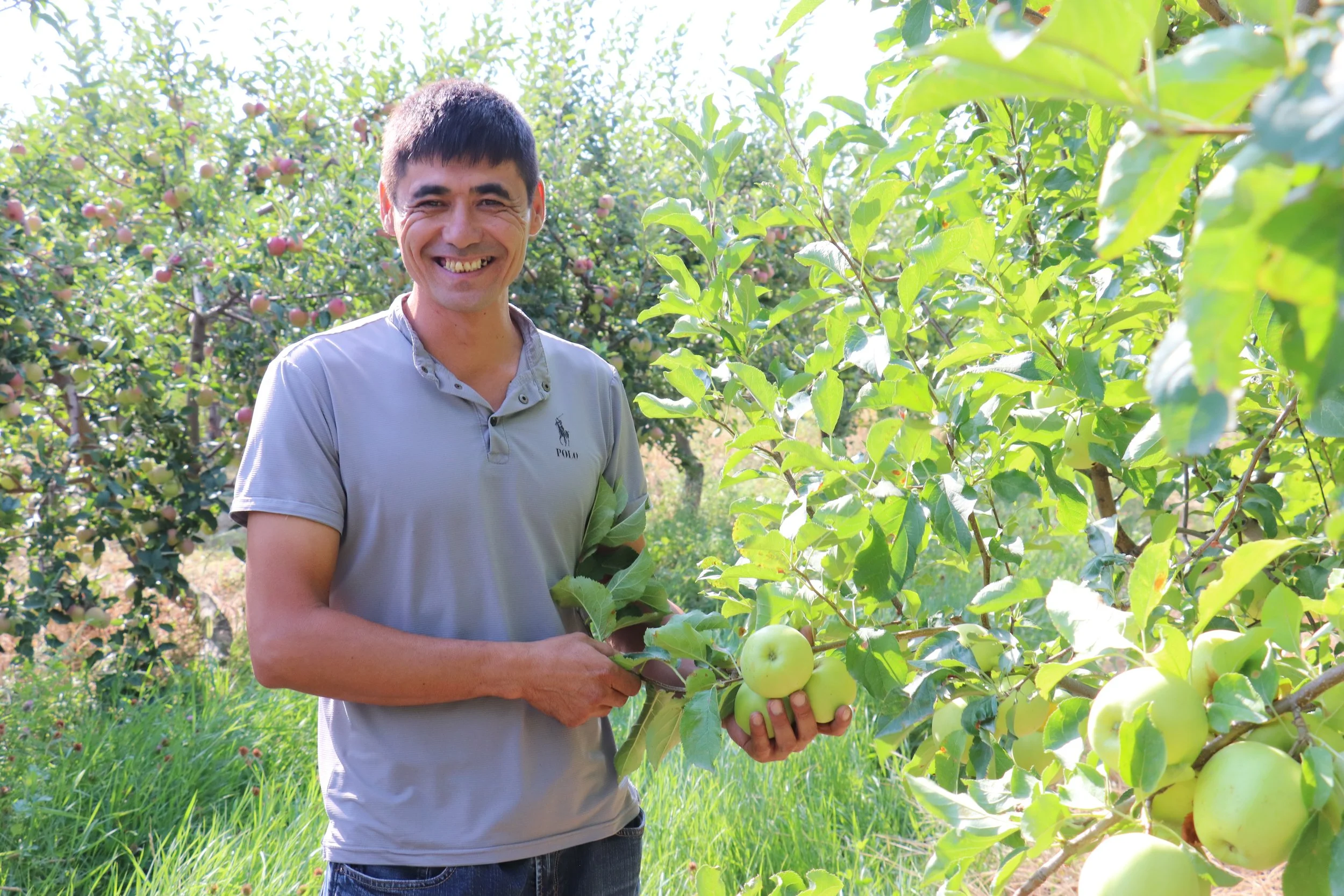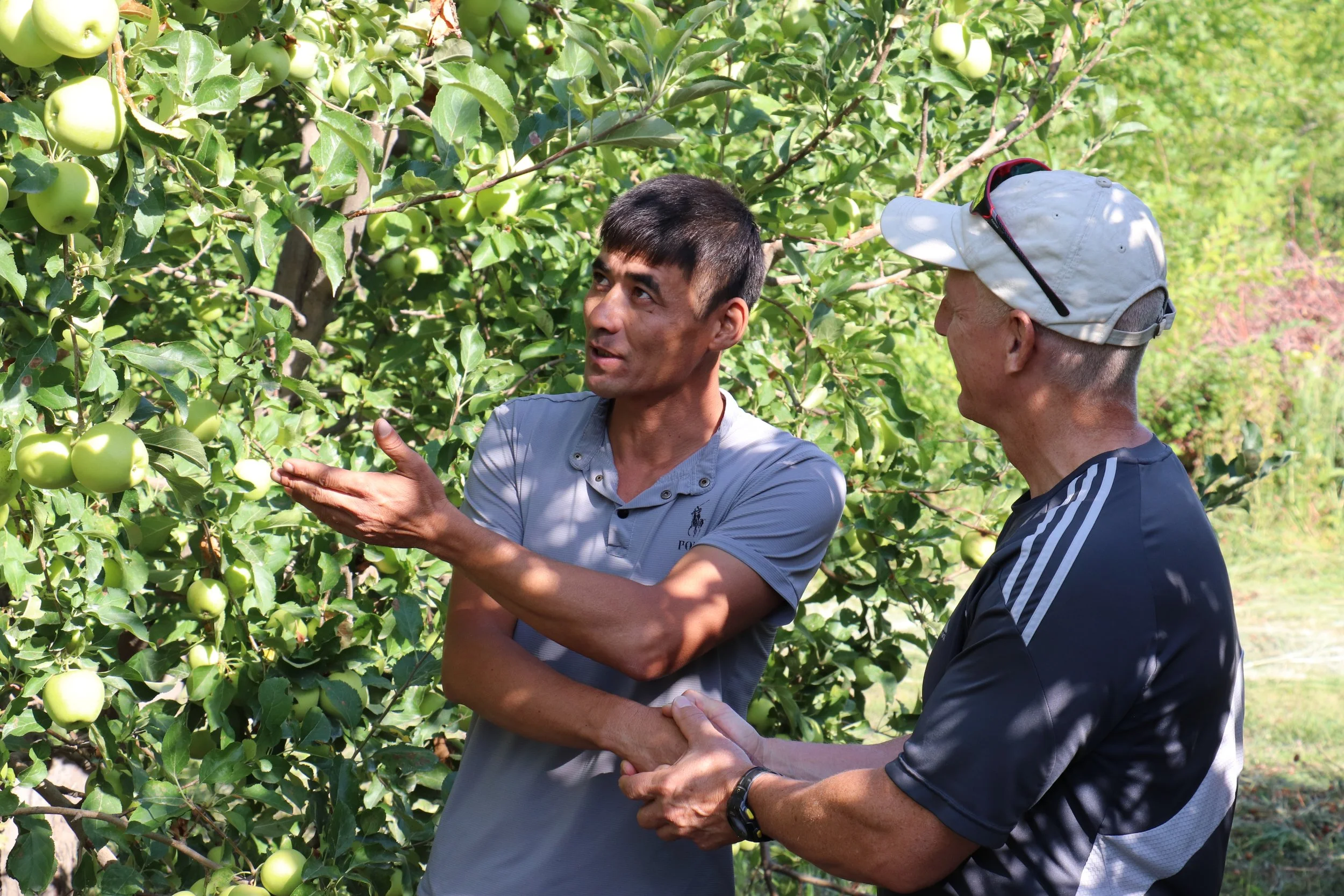
THE POWER OF PRESENCE
MEET
RAIDIN
From Skeptic to Orchardist.
His face lights up, and he rushes across the driveway to greet. He extends his right hand first, then clasps the handshake with his left. They are friends.
Raidin is a Kazakhstani farmer, and Patrick Brady from Reclaim is his teacher. Over the years, their relationship has evolved: what began as a teacher-student relationship has become a partnership, creating a beautiful bond that benefits the entire region.
Over 25 years ago, Reclaim reached out to Kazakhstan’s young government, offering agricultural support, and was directed to this fertile, historically rich southeastern region.
After years of large-scale agriculture, small farmers in the post-Soviet period lost much of their traditional knowledge. Reclaim then partnered with them to try to rediscover the best farming methods.
Reclaim introduced structured orchard management, focusing on planting and pruning fruit trees. This was a revolutionary idea for the region.
Raidin’s father was among the first to work with Reclaim, learning skills that later led to the family's success.
“My father started to collaborate with them, showing his capabilities and ideas,”
Initially, Raidin was not involved. He watched from the sidelines as his father learned from experts like Stanley Brown and Patrick Brady. The new methods, especially pruning, seemed foreign and labor-intensive.
“I thought we didn’t need a thousand trees,” Raidin admits. The family lacked equipment, fertilizer, and funds, making the orchard seem overwhelming.
They tended the trees with limited knowledge for eight years, scraping by. Yet Raidin’s father stayed committed, urging patience.
“Let’s work this orchard and see what happens,”
Raidin resisted the orchard but liked Reclaim's programs. He took a job as a security guard at the training center.
His reluctance endured. He believed the hard orchard work would bring little reward. “I thought, no one’s going to buy these apples. It’s too much work,” he says. However, that began to change when Patrick Brady saw potential in Raidin and persistently encouraged him.
Over two or three years, Raidin’s view shifted as his father’s example and Patrick’s mentorship chipped away at his doubts. “Patrick kept pulling me into learning,” Raidin says, “and my dad was pulling me too.”
The turning point came when Raidin mastered the art of pruning. He now describes this practice with near reverence. This realization changed his outlook. What began as a chore became a calling. The once-burdensome orchard produced 40 tons of apples from 1,000 trees, proving the impact of proper management.
“If pruning is done right, the tree will have a very long life. These concepts never leave my mind.”
These ideas guide his work and spiritual understanding. He sees parallels between the care of trees and the care of people. “An apple tree is like us,” he says. It can get sick; it needs sunlight; it needs to be clean. The tree will be clean and healthy if the pruning is good.”
For a decade, the community doubted pruning. Acceptance grew only after consistent orchard yields were achieved. “It wasn’t just one year,” Raidin says. “It took 10 years for our eyes to be opened.” Today, he estimates half of Kazakhstan’s farmers recognize the value of pruning. This represents a significant shift from the resistance he once exhibited.
Raidin’s thriving orchards have inspired his community to adopt modern farming practices.
Raidin’s success reached beyond his own land. Inspired by free training, he began to teach others. He passed on pruning and orchard skills to at least 100 farmers.
“The people who taught us did it for free, So, we thought, let’s teach others freely too.”
Raidin’s work reshaped his community and himself. “It was like being born again,” he says about the orchard’s impact.
He draws profound parallels between tending trees and personal growth. “If we don’t teach what we’ve learned, we’re roaming in the darkness, and we won’t give good fruit,” he says, echoing the biblical imagery of pruning as a metaphor for cleansing and growth.
“What kind of person am I, really? Who am I? Working with apple trees gave me a deeper understanding of who I am as a person. God created us, and He created us to care for his creation, these trees.”
“I now look after myself the way I look after my apple trees,” he said. “I care for them. I want them to be healthy, productive, and live long lives. I want them to be clean and for their fruit to be high quality. The same goes for me.”
The orchard also shaped Raidin as a father. Young trees require careful nurturing in their early years to produce fruit for decades. Raidin believes early guidance shapes his children’s futures in the same way.
“If we do a good job when they’re young, they’ll give fruit for 40 years or more,” he says, speaking of both trees and his family.
Raidin is aware of challenges despite his success. Kazakhstan’s apple industry is promising but faces hurdles. These include variable soil quality, harsh winter temperatures, and a lack of high-quality rootstocks. Still, the country’s climate suits apples, especially fall varieties that store well.
Raidin dreams of a school for orchardists—a five-year training program for the next generation.
“There’s so much potential,” he said, noting the possibility of crops like peaches and apricots.
From a reluctant security guard to a respected consultant, Raidin’s continues to show a life of reclaimed dignity and hope for the future.
Together, let’s help people + communities flourish!
LET’S TELL MORE STORIES LIKE THESE
Your gift empowers Reclaim to bring lasting hope and remove barriers so that people around the world can experience the fullness of their God-given dignity!
Together, we can work to provide marginalized individuals and vulnerable communities the opportunity to live flourishing, abundant lives.


